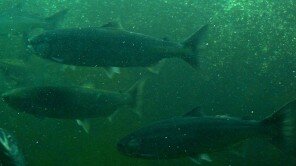
“A decade before this fall’s salmon-virus scare, a Canadian government researcher said she found a similar virus in more than 100 wild fish from Alaska to Vancouver Island,” reports Craig Welch in the Seattle Times.
Four researchers authored the paper, which studied “chum, coho, pink and sockeye salmon from the west coast of Vancouver Island, Southeast Alaska, and the Bering Sea between August 2002 and April 2003,” says the Canadian Press in the Huffington Post.
Field researcher Molly Kibenge found indications of the virus in 117 fish, though all were asymptomatic. That wasn’t terribly surprising: In a paper published in Diseases of Aquatic Organisms in 2001, where her husband Fred Kibenge was lead author, they had already concluded that wild salmon could contract–but weren’t in terrible danger from–ISAv:
Within Norway, Scotland and the Canadian east coast (considered the normal geographic distribution), ISAV has been documented to cause disease outbreaks only in marine farmed Atlantic salmon. Wild fish with virus but no disease are common (Nylund et al. 1999, Devold et al. 2000), suggesting that asymptomatic or mild infection usually occurs among wild fish in those regions.
With no particular urgency to the findings, the paper was filed away. However, back in October, the news broke that infectious salmon anemia had come to the West Coast–or at least it had according to researchers who were bucking the official Canadian government word on the subject. So the paper, which clearly disputed the official government word as well, was suddenly relevant.
Molly Kibenge tried to get permission to submit the paper for publication in a journal–which would have opened the results up to peer review, for good or bad–but fellow author Simon Jones, of the Aquatic Animal Health Section of the Pacific Biological Station, refused. “[A]ll attempts to isolate the virus into cell culture failed,” he reminded Kibenge, who would have needed no reminding because it has been very difficult to isolate the virus into cell culture, even when working from dead salmon from the enormous Chilean outbreak that decimated the farmed salmon industry there.
Molly and Fred Kibenge’s 2001 paper suggests that very thing: “It is possible that ISAV strains of low virulence and non-pathogenic strains grow poorly or not at all in currently available fish cell lines,” they wrote.
When reports of more ISAv surfaced in early November, the government shot back that its tests, supported by an independent lab in Norway, showed no such thing. The problem? The Norwegian scientists actually disagreed:
“Our results are not conclusive, but do suggest … that an ISA virus is present in wild populations of O. nerka (Pacific sockeye),” Dr. Are Nylund, a professor of biology at the University of Bergen, wrote in an email exchange with The Seattle Times.
This tempest in a cell culture is ironic given that Molly Kibenge’s research, if accurate, would tend to reduce fears about the virus being “unleashed” in Pacific salmon–they already have it, it would seem, and are managing nicely. (That’s not to rule out the likelihood that the virus could mutate into a more virulent strain.)
What remains true is that farmed salmon Atlantic salmon are particularly susceptible to the virus, due in part to the cramped conditions of said farms, just as the close quarters of cities are breeding grounds for human viruses. The Canadian government’s alleged attempt to protect them from media exposure to the virus will do nothing to prevent an actual outbreak if wild fish are acting as a reservoir.
Meanwhile, Alexandra Morton, the biologist who found the latest suspect salmon, has had it with the governmental line. In a letter to Minister Ashfield she says:
Show us your Moncton test results because your lab is the only one that cannot find ISA virus. I would also suggest you stop obsessing over the quality of the River Inlet samples and go out and get your own samples. You have an entire department at your disposal.
